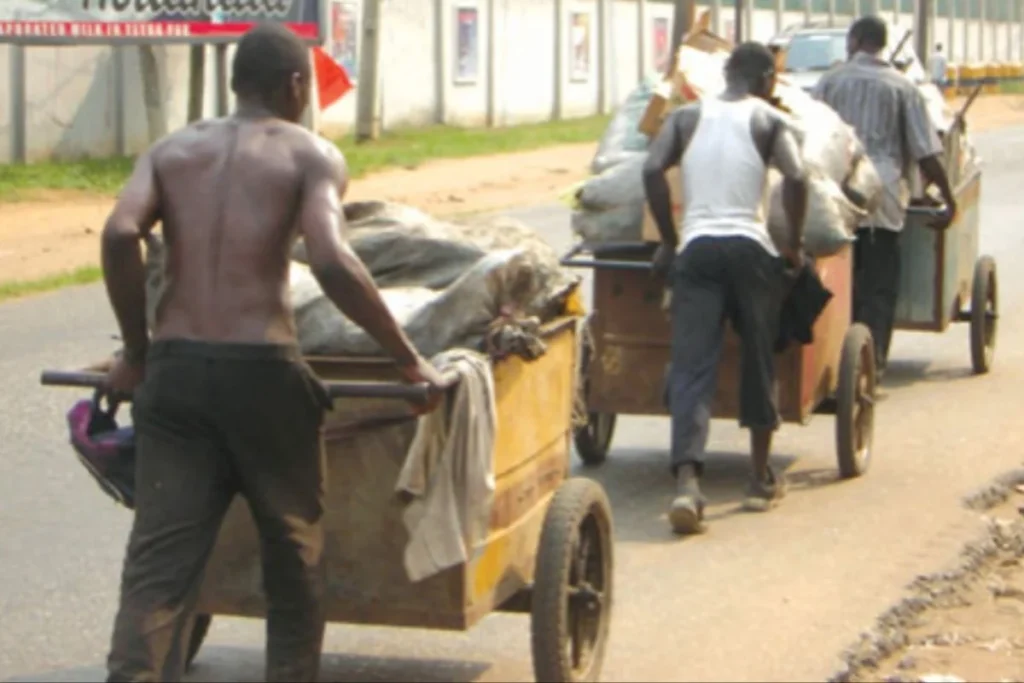Scavengers are increasingly clustering in the neighborhoods of Mararaba, Nyanya, Karu, Lugbe, and Kubwa in the Federal Capital Territory, raising concerns about their links to crimes.
Residents have expressed concerns about the activities of these scavengers, who rummage for recyclable materials like plastic and scrap metal, and have been accused of engaging in robbery and other criminal acts.
They appealed to the Federal Capital Territory Administration, FCTA, to double its enforcement, limit their activities, and avail other means of disposing domestic waste.
It was gathered that the scavengers, also known as ‘Baba Boola’, loiter around neighbourhoods at odd hours and pose a lot of security risk.
In FCT, a legal case is underway involving scavengers and beggars suing the Minister of the FCT, Nyesom Wike, over alleged rights violations.
The suit was filed by a lawyer, Abba Hikima, on behalf of vulnerable residents, including scavengers and beggars and are seeking N500 million in damages, claiming their fundamental rights were breached by the Minister and the Inspector-General of Police.
Wike, in his defense, said that the scavengers and beggars are causing a security threat to the FCT, citing their presence in unauthorized areas, public urination and defecation, and potential links to criminal activities.
The minister, in a counter-affidavit filed in opposition to the case instituted on behalf of some vulnerable FCT residents, told Justice James Omotosho to dismiss the N500 million suit in its entirety, adding that begging is not a trade known to law.
According to him, many of the purported scavengers have been arrested in the various acts of vandalising private and public property and, in most cases, serving as spies to kidnappers, criminals and terrorist organisations.
“The said homeless people who reside and sleep on public roads and under the bridges without any proper form of toilet system rely heavily on open urination and defecation, which litter the streets of Abuja and threaten the environment and health of fellow citizens within the FCT,” he said.
The case, which is before the Federal High Court in Abuja, and its judgment is expected on July 10, raises questions about the rights of vulnerable citizens, the responsibilities of the government to protect its citizens, and the balance between development and the needs of marginalized populations.
The lawyer representing the scavengers and beggars argued that homelessness and petty trading are not crimes and that the actions of the FCT administration are infringing on their rights.
Speaking , a concerned teacher in Mararaba, Ngozi Ezike, said that Abuja is fast becoming a hotspot for kidnappers and other criminal elements due to its porous boundaries and security set up.
Ezike said two major incidents of burglary were reportedly carried out by scavengers, and nothing has been done to permanently end the menace.
“Abuja, especially this Mararaba axis is becoming something else. We cannot go to bed with two eyes closed because of fear of the unknown.
“Nothing has been done about the latest incident where scavengers broke into one’s house and carted away valuable things,” she said.
Another resident in Nyanya, Mariam Musa, regretted the absence of an organised management to collect domestic waste, adding that the flawed system empowers criminals.
“Previously, the Abuja environmental board was more organised. As long as there is no means of disposing of domestic waste, the scavengers will keep increasing in numbers. The evil these scavengers are capable of is limitless,” she said.
On his part, Deji Ayo, a resident of the Karu area of the FCT, blamed the rising insecurity in the nation’s capital for the situation, stressing that Karu used to experience peace before the increased number of scavengers and beggars in the area.
Another resident, Mike Divine, who stays in Lugbe, said the menace of scavengers in Abuja had exposed residents to pilfering, burglary, illegal surveillance, knife attacks, and hooliganism.
Divine said during odd hours, the scavengers inflict violence on innocent individuals and vandalise government properties, advising the Federal Capital Territory Administration, FCTA, to implement the ban on indiscriminate disposal of refuse, and scavenging.
“The authorities should implement the ban, which should include moving these young people to skills acquisition centres or other sources of livelihood, while the waste management system in the city needs to be effective, thereby making their (scavengers’) access to bins difficult,” he said.
In an interview with some scavengers, Ibrahim Dantata, he said he embarked on the job to make ends meet.
“There is no job. I have no education and I have no skill. Not every scavenger is a thief.
“I know people are ruining our reputation but we are all not bad. I am into this business because it helps me feed my four wives and nine children in Zamfara,” he said.
Another scavenger, Kabiru M’uazu, who carries out his business in Nyanya, said any scavenger caught stealing should be made to face the full wrath of the law.
He said: “We don’t tolerate stealing among ourselves. Anybody who is caught stealing faces disciplinary actions by us. We either collect their truck or we go physical on them.”
FOLLOW US ON:
ADVERTISE WITH US:
